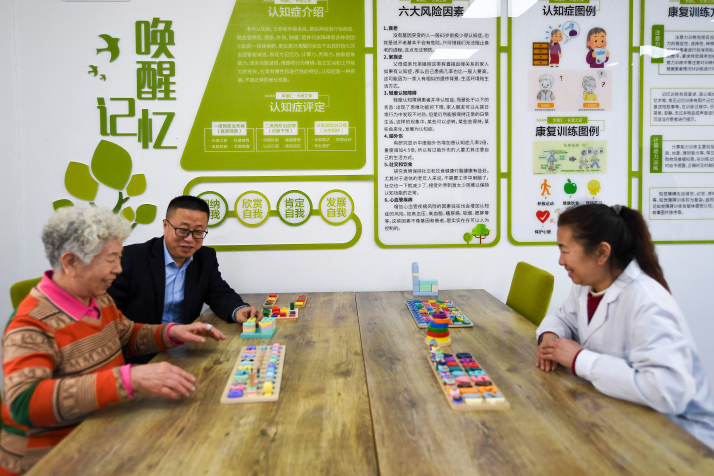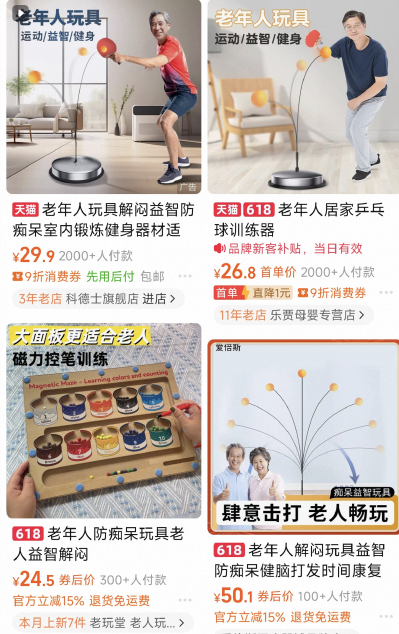| China |
| Addressing loneliness and cognitive decline, a new market emerges for toys tailored to the needs of China's aging population | |
|
|
 Community workers and a senior citizen play brain training games designed to prevent dementia at a community elderly care center in Siping City, Jilin Province, on April 24 (XINHUA)
Buying toys for his father was once unimaginable for a Hangzhou (Zhejiang Province) resident surnamed Li, born in the 1980s. "A few years ago, my father's hands trembled slightly when he picked up food with chopsticks, and he mostly just watched TV by himself at home," Li told Beijing-based China Comment magazine. Li bought his father a squeezing toy to strengthen his grip and an AI chessboard to combat his loneliness. Li's actions reflect a growing trend: Toys are becoming increasingly popular among seniors, fueling a new wave in China's silver economy, which encompasses economic activities and services catering to the aging population, including sectors like healthcare, tourism and education. Data from the National Bureau of Statistics show that China's population aged 60 and above exceeded 310 million at the end of 2024. This growing demographic is propelling senior-friendly toys from a niche category into a category with promisingly broad market. E-commerce platform Taobao's statistics reveal the trend: In the past year, searches for "senior toys" on the platform surged by 124 percent year on year, and the transaction volume for these toys jumped by over 70 percent. Seizing the opportunities Guan Weijiang, a merchant with a decade of experience selling children's toys in Yiwu, a renowned global small commodities trading hub in Zhejiang, recognized this shift. In the past year, exercise and mind-stimulating toys, popular among elderly consumers, have frequently sold out on his online store. The proportion of customers over 50 has risen to 30 percent. Judging senior toys to be a highly promising sector, Guan decided to capitalize on this new opportunity and began producing toys specially for seniors. "In fact, as seniors' toys and children's toys are similar in some aspects, some children's toys can be transformed into senior-friendly toys with just some minor adjustments," Guan told China Comment. Within just three months of introducing his line of senior toys, the sales of his more than 10 types of senior toys online far exceeded expectations. "During the Spring Festival holiday in 2024 (February 10-17), we shipped more than 10,000 orders per day," Guan said. Recently launched products, such as punching bags and table tennis bounce-back trainers, have also proven to be highly popular. The rise of the senior toy market is not only fostering new consumption growth but also driving significant transformation within traditional industrial chains. The evolution of Yunhe County in Lishui, Zhejiang, is particularly noteworthy in this industrial shift. As the recognized "Hometown of Chinese Wooden Toys," Yunhe is leveraging its decades of industrial expertise to develop senior-friendly wooden toys. To date, the county has developed and produced over 200 types of wooden toy products designed to improve hand-foot coordination and slow memory decline in the elderly. Yin Qian, head of Zhejiang Mimi Zhikang Technology Co. Ltd., told China Comment that her company, in collaboration with the Brain Health Research Team of the Health Science Center of Xi'an Jiaotong University and the Alzheimer's Disease Prevention and Treatment Research Project Team of Shaoxing in Zhejiang, has created over 100 wooden toy products for seniors that combine entertainment with brain-boosting functionalities. These innovations have resulted in over 30 patents and have served more than 500 nursing homes. Yunhe is also actively expanding into overseas markets, promoting its elderly wooden toys to nursing homes internationally. "In 2024, our products were exported to countries including Germany and Japan and were well-received by elderly people abroad," Yin said. Their customized strategy has been key to unlocking the overseas market. For example, recognizing the popularity of chess among German seniors, the company designs and develops wooden chess sets. Similarly, given the popularity of the kendama (cup and ball) game among the elderly in Japan, the company has established a dedicated production line for it. In the first quarter of this year, the company's sales of elderly wooden toy products increased by 50 percent year on year. The senior toy industry in the county will be boosted with further government support. An official from the local government said the county will increase support for the research and development, as well as the industrialization, of core technologies for elderly products.  A screenshot of toys for seniors on e-commerce platform Taobao (SCREENSHOT)
Challenges Li Simin, a physician in the Geriatrics Department at the Third Affiliated Hospital of Zhejiang Chinese Medical University, said the rising popularity of senior-friendly toys is essentially society's response to the spiritual needs of the elderly. "The social life of the elderly shrinks significantly after retirement, so they are prone to feeling lonely. Suitable toys can bring a lot of fun to their lives. Games such as role-playing board games and card games require the cooperation of multiple people. By participating in these activities, the elderly can increase the frequency of social interaction, which helps reduce stress," Li explained. However, the potentially lucrative market for senior toys also faces challenges and pain points. For example, while online sales are booming, physical stores selling these toys are scarce, so it is inconvenient for seniors not adept at shopping online to buy such toys. Furthermore, the types and functions of these toys are often limited and some are simply rebranded children's toys. Beyond this, some people consider buying toys for seniors too childish, and some adults who purchase toys for their senior parents find them quickly abandoned due to a lack of interest. A resident surnamed Ning in Guangzhou, Guangdong Province, is one such frustrated adult. After her mother retired, she constantly complained about the monotony of her life. Seeing her mother bored, Ning bought her a jigsaw puzzle and a rebound exercise ball online, hoping to bring her joy. However, after only a few days, Ning found them gathering dust in a corner. Her mother explained that the puzzle patterns were too intricate and strained her poor eyesight, and that the exercise ball was boring to play with, preferring to watch TV instead. This scenario of abandoned toys for seniors reflects a structural imbalance between supply and demand in the market. Notably, China has not yet issued "age-appropriate" standards for toys, only for products in the areas of home furnishings, clothing, fitness equipment, furniture and home appliances. This lack of standards results in some senior toys being either too perfunctory or too complex, lacking appeal to seniors. Industry insiders emphasize that senior toys should not be limited to conventional items like Luban locks (a traditional Chinese puzzle made of beautifully fitted interlocking wooden pieces, which is easy to take apart but challenging to reassemble) but should explore and innovate to develop a wider range of products. Copyedited by G.P. Wilson Comments to jijing@cicgamericas.com |
|
||||||||||||||||||||||||||||
|